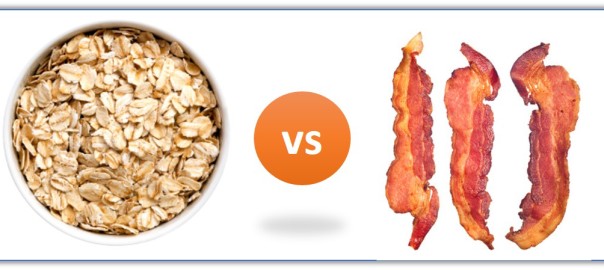Are you confused about how much fat you should eat? You have good reason! Many journalists and “internet experts” skillfully weave convincing stories about a large body of research. We are often told to ignore academic experts and decades of nutrition research. What’s going on here?
A recent example is journalist Ian Leslie’s “The Sugar Conspiracy.” This was indeed a good story and quite persuasive. Leslie provides a historical account of the research on the role of fat intake and heart disease. He states that the current recommendations of nutrition experts are wrong, and explains that nutrition researchers are biased and discount studies that don’t fit with their thinking.
Leslie has many convincing arguments, relying heavily on work of popular journalists Gary Taubes (Good Calories Bad Calories; Why We Get Fat) and Nina Teicholz (Big Fat Surprise), but he ignores a large body of evidence that would support any counter-arguments. Is he, and other sugar conspiracy proponents, guilty of the biased thinking for which they accuse nutrition researchers?
I’ll will examine Leslie’s arguments below, and summarize the following topics to help you understand the current nutrition debates.
- Does Fat or Sugar Cause Heart Disease? John Yudkin vs Ancel Keys
- Did Americans Get Fat and Sick Because of Dietary Guidelines?
- Making Sense of Nutrition Science
- Fats or Carbs?
- Examining the Credibility of Two Popular Anti-Carb Crusaders
- Bottom Line
John Yudkin vs. Ancel Key’s: Does Fat or Sugar Cause Heart Disease?
Leslie provides a fascinating account of how in the 1970’s, prominent nutrition researchers ridiculed the work and destroyed the reputation of a scientist (John Yudkin) who proposed that sugar was responsible for heart disease, diabetes, and obesity. Good story material for sure – bad guys, a good guy, and a conspiracy.
Did this really happen? A nutrition scientist has scrutinized Leslie’s account of the story and provides an evidenced-based interpretation of Ancel Key’s research here. (Spoiler alert: Not really). Have a look! You’ll also figure out how to interpret the graph below:
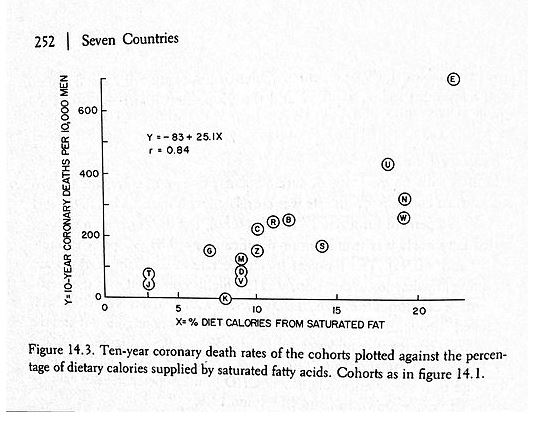
Does the research of good guy John Yudkin stand up to scrutiny? Kevin Klatt has reviewed his research here, and concludes that “there were significant limitations of Yudkin’s work and of the hypotheses surrounding sugar at the time.”
Did Americans Get Fat Because of Dietary Guidelines?
“Scientists have to reckon with the fact that the obesity epidemic basically began with the first dietary guidelines. You can’t look at that and not think we’ve done something terribly wrong” – Nina Teicholz
O.K., the first set of guidelines weren’t perfect. But, did they cause the obesity epidemic? Maintaining an ideal weight is critical to good health, and featured prominently in Guideline #2. Only 2/7 guidelines relate to Teicholz’s concerns (#3 and #4 to limit fat and eat adequate starch), but even then they emphasized whole foods. And don’t miss guideline #5 (I think Nina may have) – Avoid Too Much Sugar.
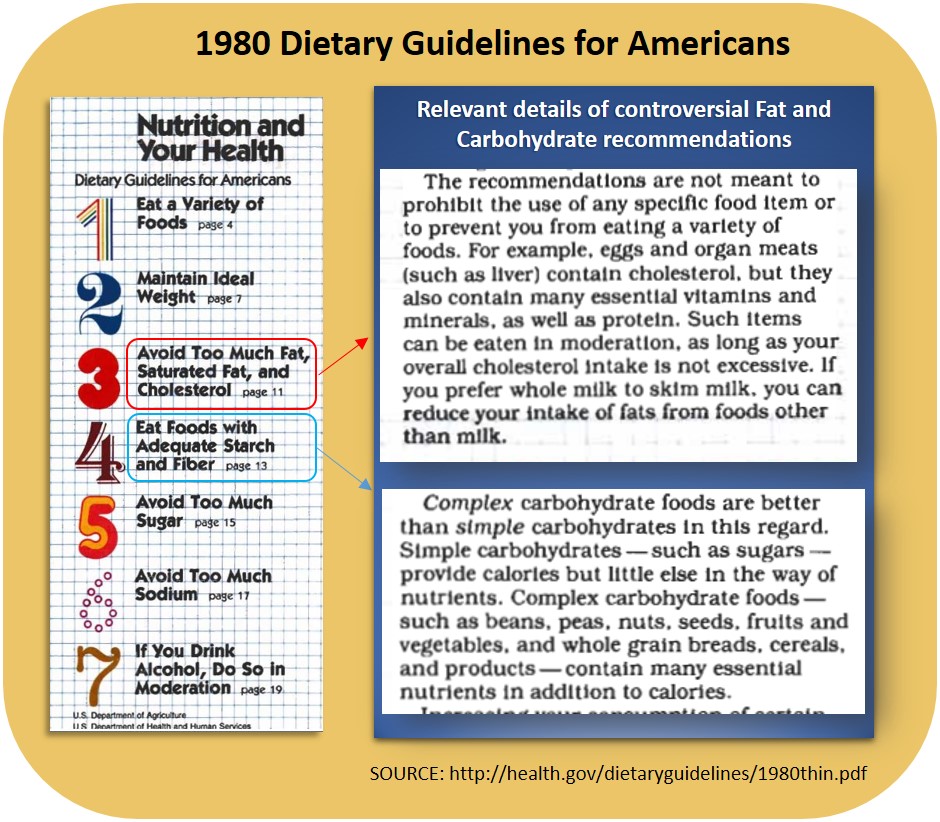
Contrary to stories of Leslie, Taubes, and others, these guidelines show there has been longstanding and prominent advice to limit sugar and refined carbohydrates. And, as I wrote in this article, contrary to what Teicholz, Leslie, and others allude most people did not follow the guidelines.
BIG Food = BIG Bodies
Did Americans Follow the Guidelines? While the 1980 Guidelines discouraged too much sugar and refined carbohydrates, Americans increased their intake of these foods: importantly, they also increased total calories and did not follow the low-fat recommendations, and they got fatter. Was eating this way an unintended consequence of the Guidelines to reduce fat intake? Doubtful.

Although nutrition experts emphasized vegetables, fruits, beans, and fiber-rich grains, the food industry latched onto “low fat,” and replaced fat in junk food with less healthful ingredients (more sugar/refined carbohydrates). Food giants like Pepsico and Nabisco (Snackwell’s) produced low-fat cookies, chips, and other snacks and cleverly marketed it as healthy, because it was low in fat. And this was quite profitable.
The food industry has large budgets, powerful marketing, and their bottom line is money, not public health. Consumer confusion and distrust in nutrition experts and evidence-based guidelines can actually be good for their bottom line. The food industry’s influence is far-reaching: consider also that they have a big say in Dietary Guidelines. James Hamblin’s How Agriculture Controls Nutrition Guidelines is a good example of the industry sowing distrust in science.
So, clever food marketing and not nutrition experts convinced people that anything labeled “low fat” was healthy (even cookies . . . so why not eat two?). And it worked! Research now confirms that simply seeing the words “low fat” on a label encourages consumers to eat more.
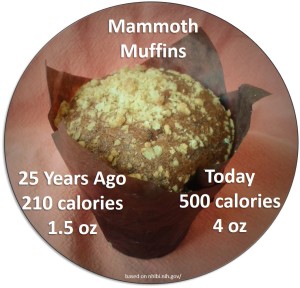 Portion sizes have increased dramatically and we eat more when served larger portions, another factor that has contributed to the obesity epidemic and chronic disease. Consider that an average restaurant meal contains almost a day’s worth of calories. The fact that we are simply eating too much shouldn’t be ignored or misconstrued while debating the merits of fats vs carbs in the diet.
Portion sizes have increased dramatically and we eat more when served larger portions, another factor that has contributed to the obesity epidemic and chronic disease. Consider that an average restaurant meal contains almost a day’s worth of calories. The fact that we are simply eating too much shouldn’t be ignored or misconstrued while debating the merits of fats vs carbs in the diet.
Beyond the food industry, sedentary behavior, our obesogenic environment, and other influences have contributed to rising rates of obesity and preventable diseases. It is deceptive to blame these conditions on nutrition recommendations.
The 2015 Guidelines were generally well received by the nutrition community – see a review by Marion Nestle and my interpretation, which I summarized in the graphic below. The scientific committee also recommended a goal of environmental sustainability, but lobbying power was strong and this was not included in the final guidelines.
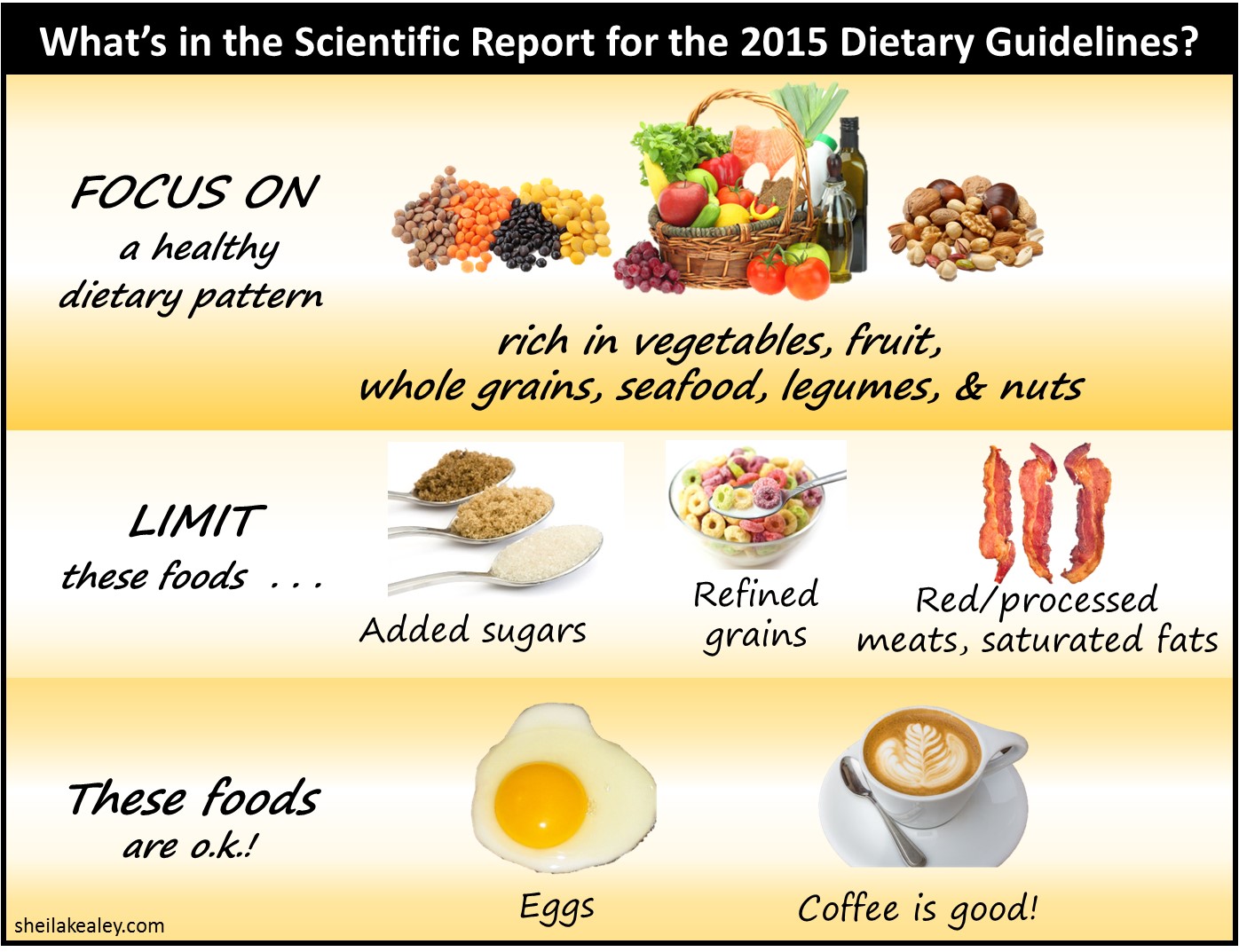
Ms. Teicholz launched a full-fledged campaign against the 2015 Guidelines. Her criticisms are explained in this article.
Making Sense of Nutrition Science
Making dietary recommendations requires considerable expertise to interpret research from various fields, put it in context, and consider the cumulative scientific knowledge in the area. Many have criticized Teicholz’ ability to objectively critique research. According to Teicholz
“Americans have been the subjects of a vast, uncontrolled diet experiment with disastrous consequences.”
But how much weight should you give to individual studies? Just because a study was conducted in mice, or because a human study was “observational” doesn’t mean it should be discounted. And even the results of long-term well-designed clinical trials need to be carefully interpreted. (If you’re curious about how to weight various evidence, here’s a good primer). Nutrition researchers do recognize the limitations of dietary data and implications for making evidence-based recommendations. Importantly, experts often have strict methodologies for examining the scientific literature (see examples below). Unfortunately, the same can’t be said for many popular books and news articles, as is evident in a critical review of the Big Fat Surprise.
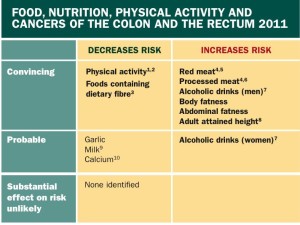 Even Experts Disagree. . . But That’s O.K.! People complain that findings of research studies contradict each other. But, as explains epidemiologist Michael Marmot, who chaired the WHO World Cancer Research Fund’s examination of the evidence of diet and lifestyle influences on cancer, “That is the nature of science and a source of its strength.” For example, the World Cancer Research Fund review has a panel of expert scientists who examine and debate the scientific evidence to come up with recommendations to guide new research, prevention guidelines, and policy. They categorize the evidence as (1) convincing; (2) probable, or (3) substantial effect on risk unlikely. For example, this graphic shows how they categorized lifestyle risks on colorectal cancers.
Even Experts Disagree. . . But That’s O.K.! People complain that findings of research studies contradict each other. But, as explains epidemiologist Michael Marmot, who chaired the WHO World Cancer Research Fund’s examination of the evidence of diet and lifestyle influences on cancer, “That is the nature of science and a source of its strength.” For example, the World Cancer Research Fund review has a panel of expert scientists who examine and debate the scientific evidence to come up with recommendations to guide new research, prevention guidelines, and policy. They categorize the evidence as (1) convincing; (2) probable, or (3) substantial effect on risk unlikely. For example, this graphic shows how they categorized lifestyle risks on colorectal cancers.
The Scientific Committee for the Dietary Guidelines reports also follow a detailed protocol to interpret the literature, as explained here.
Do you think authors of newspaper articles and popular books or “internet experts” have such rigorous protocols or methodologies when they interpret the scientific literature? It’s something to think about before you trust their stories.
Fats or Carbs?
What’s All the Fuss About FATS?
The 1980’s Guidelines advised avoiding too much fat or saturated fat. Now more evidence shows that certain fats are beneficial and should be part of a healthy eating pattern. These “healthy’ fats include monounsaturated and polyunsaturated fats found in nuts, seeds, fatty fish, and some vegetable oils. Trans fats – found primarily in processed foods – are considered unhealthy and should be avoided.
The role of saturated fat in health is a topic of much debate (and confusion!). Years of research have associated saturated fat with heart disease, some cancers, and diabetes. But more recent studies suggest that some types of fats may not be as harmful to some conditions as once thought. However, the evidence isn’t strong enough to disregard research showing saturated fat intake is harmful.
 Are Meat and Butter Good for You? Many headlines interpret the emerging research on saturated fats as meaning that certain foods are good for us. While the role of saturated fat in heart disease needs more study, saturated fat intake is linked to other diseases. In terms of cancer, there is still considerable evidence linking high consumption of meat and/or processed meat with an increased risk of cancer mortality and an increased risk of incident cancers, particularly colorectal cancer. Just because something is not as bad as once thought, doesn’t mean it’s beneficial, especially in copious amounts. Replacing cookies with cheese might be a good swap, but replacing cookies with nuts is likely better.
Are Meat and Butter Good for You? Many headlines interpret the emerging research on saturated fats as meaning that certain foods are good for us. While the role of saturated fat in heart disease needs more study, saturated fat intake is linked to other diseases. In terms of cancer, there is still considerable evidence linking high consumption of meat and/or processed meat with an increased risk of cancer mortality and an increased risk of incident cancers, particularly colorectal cancer. Just because something is not as bad as once thought, doesn’t mean it’s beneficial, especially in copious amounts. Replacing cookies with cheese might be a good swap, but replacing cookies with nuts is likely better.
CARBOHYDRATES Can Be Confusing, but That Doesn’t Make Them Bad
The type of carbohydrate you eat is likely more important than the amount. Carbohydrate critics tend to lump all carbohydrates into one category (somewhat like equating candy to broccoli). Vegetables, fruits, whole grains, and legumes are carbohydrate-rich foods, and affect the body differently than the refined and processed carbohydrates found in many popular foods.
Certain people may be more susceptible to the influences of carbohydrates on insulin (but again, eating lentils will influence the body differently than cake . . .). And how we metabolize carbohydrates has a lot to do with how active we are: though some studies do account for physical activity, even those participants categorized as “active” do not move much.
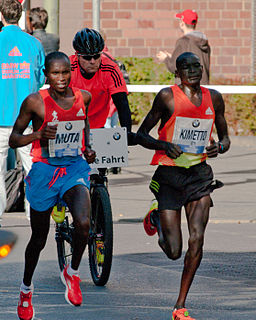 The world’s fastest distance runners have very high carbohydrate diets (about 75% carbs for Kenyans and 65% carbs for Ethiopians): and good evidence shows carbs are the preferred fuel for endurance athletes. New research recommends tailoring carbohydrate consumption to activity intensity and duration. Some athletes seem keen to try High Fat Low Carb (HFLC) diets, despite the fact that carb restriction compromises the effectiveness of high intensity interval training and no evidence shows performance benefits. The research is quite limited: an expert in this area, Louise Burke, provides a good evidence-based summary of the state of research on HFLC diets for athletes here.
The world’s fastest distance runners have very high carbohydrate diets (about 75% carbs for Kenyans and 65% carbs for Ethiopians): and good evidence shows carbs are the preferred fuel for endurance athletes. New research recommends tailoring carbohydrate consumption to activity intensity and duration. Some athletes seem keen to try High Fat Low Carb (HFLC) diets, despite the fact that carb restriction compromises the effectiveness of high intensity interval training and no evidence shows performance benefits. The research is quite limited: an expert in this area, Louise Burke, provides a good evidence-based summary of the state of research on HFLC diets for athletes here.
Dietary Patterns Matter More than Nutrients
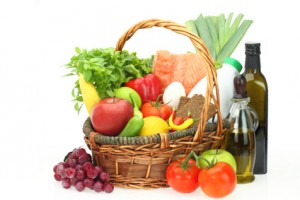 Experts agree that it’s critical to consider the overall dietary pattern: eating less saturated fat won’t be helpful if the rest of your diet is full of highly processed foods. Though there are many healthy ways to eat (low carb and low fat), a large body of research shows that the most disease-protective dietary patterns are Mediterranean, DASH (Dietary Approaches to Stop Hypertension), or patterns assigned by studies as “Prudent” “High Quality” or “Healthy Eating” – they all contain healthful carbohydrates.
Experts agree that it’s critical to consider the overall dietary pattern: eating less saturated fat won’t be helpful if the rest of your diet is full of highly processed foods. Though there are many healthy ways to eat (low carb and low fat), a large body of research shows that the most disease-protective dietary patterns are Mediterranean, DASH (Dietary Approaches to Stop Hypertension), or patterns assigned by studies as “Prudent” “High Quality” or “Healthy Eating” – they all contain healthful carbohydrates.
Examining the Credibility of Two Popular Anti-Carb Crusaders
Nina Teicholz and Gary Taubes are journalists with a disturbing degree of influence. Should we be trusting them to interpret nutrition research?
Nina Teicholz
Big Fat Surprise “Painstakingly Researched?” While Leslie calls Teicholz’s book “painstakingly researched,” most evidence-based reviews show that Teicholz lacks the appropriate nutrition expertise to critique studies and put decades of research in context. Many experts question her credibility and you should too.
Here is a detailed scientific critique that fact checks Teicholz’s text that outlines the many errors and biases (see The Big Fat Surprise: A Critical Review (Part 1; Part 2). Here are a few examples:
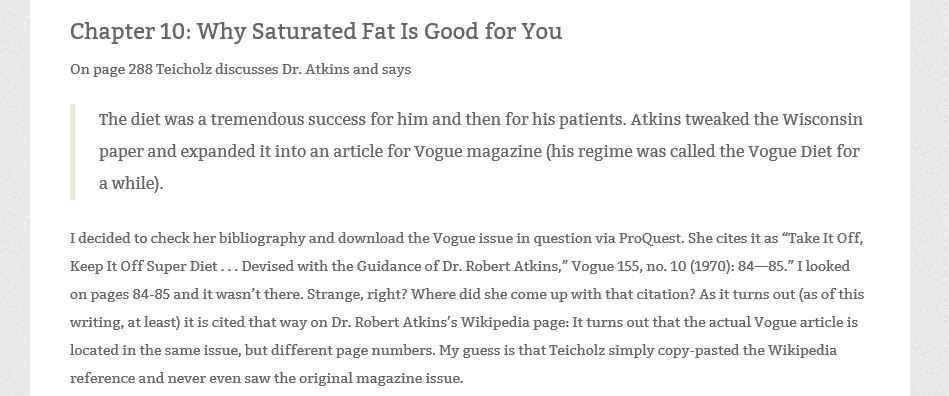

Gary Taubes
Gary Taubes argues that the main cause of obesity is eating too many carbohydrates. Many talk about the insulin-carbohydrate hypothesis of obesity as if it is fact. In reality, numerous studies don’t support this hypothesis. Obesity researcher Stephan Guyenet does a nice job explaining the insulin-carbohydrate hypothesis and outlines why you should question this reasoning.
The latest study to refute this hypothesis, published in Cell Metabolism, showed that for the same number of calories, a low-fat diet was better than a low-carb diet to lose body fat. This was a “feeding study” – one of the most rigorous forms of studies that I summarize below:
Study participants received two diets in random order (a low-carb diet and low-fat diet) and spent part of the study in a “metabolic chamber” that captured all the air they inhaled and exhaled. Urine and body gases collected allowed researchers to determine the number of calories participants were burning and whether those calories came from carbohydrates, fat, or protein. Calories were restricted, so, as expected, participants lost weight and body fat on both diets. The low-fat diet seemed to have a metabolic advantage, and the low-carb diet slowed metabolism. A low-fat diet didn’t slow metabolism, and had increased fat burning and fat loss compared to the low-carb diet.
Do these results mean that “low-fat diets are best to lose fat” or “low-carb diets don’t work”? No, although this type of interpretation is common. The study authors caution that they conducted the research to better understand metabolism and energy balance, and not to form the basis of dietary recommendations. Here’s a good interview with the lead author explaining the study results, and if you’re interested in how this study relates to the carbohydrate-insulin hypothesis of obesity, obesity researcher Stephan Guyenet explains that here.
The insulin-carbohydrate hypothesis is an important theme in Taube’s anti-carb campaign and his books “Good Calories/Bad Calories” (you’ll find an excellent critical review here) and “Why We Get Fat.” Obesity expert Yoni Freedhoff provides an excellent and detailed review of the book. Among many other criticisms . . .
“Taubes seems to have decided to abandon journalistic and scientific integrity in place of observational data, straw men and logical fallacy.”
“Taubes doesn’t just rely on non-scientific argument, he also appears to be comfortable in ascribing his beliefs to other people and to omitting facts when it’s convenient.”
Bottom Line
Should we trust the work of nutrition scientists? Critics claim that their diet recommendations led us to eat more sugar and refined carbohydrates, but this is not true. On the contrary, the first recommendations issued in 1980 recommended limiting sugar and refined carbohydrates. Obesity is a complex problem and it does not have a single cause. Put simply, people eat too much, likely due to a variety of influences, including the food industry, sedentary behavior, and our obesogenic society. Understanding the multiple factors that influence obesity and preventable chronic diseases is critical, and undermining the public trust in nutrition research is not helping progress.
Some Key Points:
- Nutrition science is difficult to conduct and interpretation can be complicated. Experts in the field are the best ones to interpret this research, not clearly biased journalists
- Conspiracies make for a good story, but typically don’t represent good science
- Nutrition experts never recommended increasing sugar intake or intake of refined carbohydrates, and it is doubtful that this was a direct consequence of nutrition guidelines
- Food industry marketing is more persuasive than the advice of nutrition scientists
____________
Photo of Kenyan runners in Berlin Marathon By Dirk Ingo Franke (Own work) CC BY 3.0 via Wikimedia Commons
Share This: